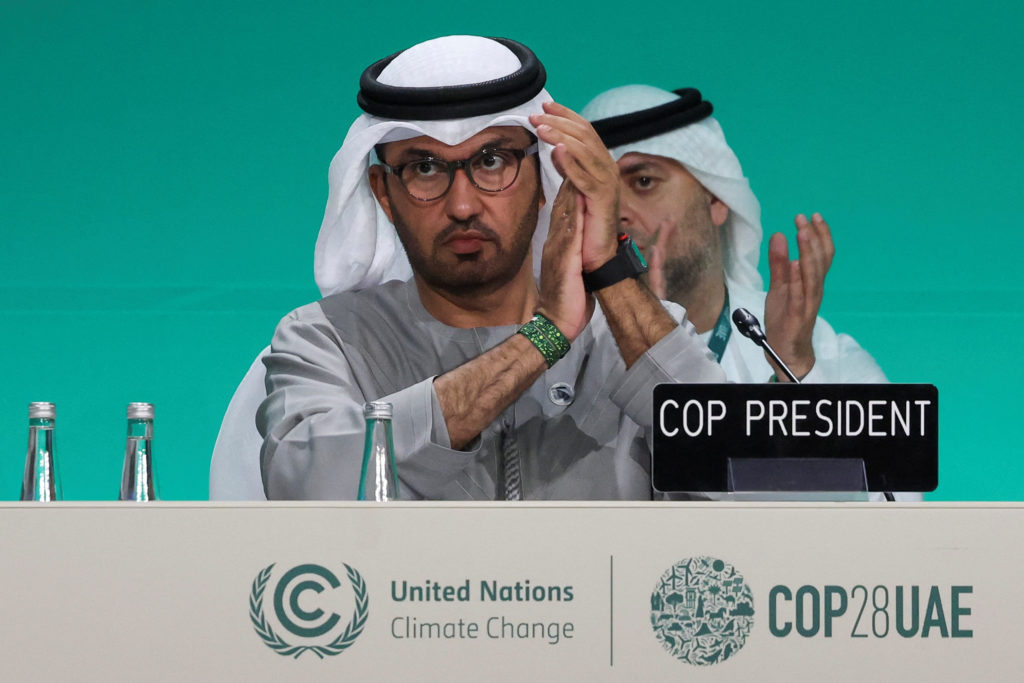
In the middle of a sprawling venue where the city meets the desert in Dubai, nearly 100,000 people gathered over two weeks for the 28th Conference of the Parties (COP) to the United Nations Framework Convention of Climate Change.
Nearly 200 nations reached a deal Wednesday that called for a transition away from fossil fuels, the first time they were mentioned directly in a COP agreement.
This year, an increased focus of the conference was the ways in which climate change and burning fossil fuels affects health. It is for that reason that Tess and I – an emergency room physician and a health reporter, respectively — made our way to COP this year. It was my first time and Tess’ second at the international meeting.
The focus on how climate change affects health is fairly new. In the last two years, the health presence from around the world at these meetings has skyrocketed; from physicians and nurses to physical therapists and public health leaders. These medical practitioners are now attending in larger numbers because they are seeing consequences for patients: in clinics, in hospitals and across populations everywhere.
WATCH: How physicians are preparing for climate change and extreme heat’s impact on human health
Session after session during the COP meetings laid out the multiplicity of ways climate change and burning fossil fuels affect health. Along with the increasing frequency and intensity of heat waves across the globe, there was concern about “lethal humidity,” which in threatening the body’s ability to cool itself makes high temperatures more dangerous.
This “lethal humidity” can occur at lower temperatures than previously thought — at around 95 degrees Fahrenheit at 100% humidity —leaving billions more people vulnerable to this threat decades sooner than expected. Then there are the other extreme weather events, including storms, floods, and wildfires, which combined with heat, cause the disruption of food systems and increases in water borne illnesses like cholera and dysentery.
While some effects of climate change on health are immediately obvious, others play out over time. Breathing in particles from burning fossil fuels exacerbates respiratory conditions like asthma immediately; in the long term it can also lead to lung cancer, stroke, and heart disease. More recently, scientists and doctors have begun to understand it also contributes to increased risk for dementia and Parkinson’s Disease. All told, more than 8 million people die globally each year because of fossil fuel pollution, according to a 2021 study by Harvard University in collaboration with University College London, the University of Birmingham and the University of Leicester.
The meetings also addressed the important relationship between increased temperatures and mental health challenges and disorders.
WATCH: How Texas became the renewable energy leader
While all this may seem sobering, this focus on climate and health signaled something important: for the first time there was high-level recognition that climate change harms human health. COP’s first ever “health day” was capped by a ministerial session, attended by 49 health ministers, along with senior representatives from more than 100 nations. Countries were asked to endorse a Declaration of Climate and Health committing to tackle health harms from climate change, including incorporating health targets in national adaptation plans, increasing climate and health financing, fostering cross-sectoral collaboration, building resilient and sustainable health systems, and reducing emissions. Since then, 142 countries have signed the declaration. And there is new funding to address this work. At COP28, $2.1 billion was pledged by a variety of sources for health, food security and protection of vulnerable communities across the globe.
At the end of the first week, we attended a reception for around 300 climate and health professionals from every continent but Antartica. You could feel the energy in the room. The majority of those attending were young, signaling a new generation of health leadership. The World Health Organization’s climate and health head Dr. Maria Neira took the stage and said, “There is no going back. We are here to stay; Health will continue to play a central role in the climate change conversations.” The discussions at the reception were filled with hope, about solutions, about how each 0.1 degree of warming avoided would save countless lives.
At the end of this COP, Tess and I were both left buoyed by how the world’s most trusted profession is galvanizing to tackle climate change for themselves and their patients.
ncG1vNJzZmivp6x7sa7SZ6arn1%2Bjsri%2Fx6isq2enpL%2BtsI6aq2abn6V6c4SMoKOompGheqS7zaycp6ulqHqwuoyhprBlk6G2rq3TnmScoJGjtKZ5wJ%2BdnpukqHqpscClq6E%3D